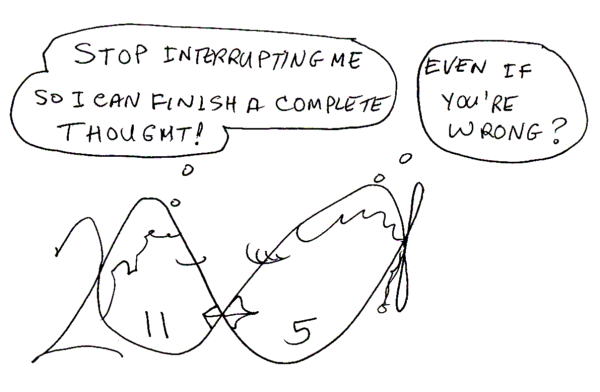In conversation, you pay a price every time you interrupt:
- It makes the person feel invalidated and thus more likely closed to what you have to say.
- It makes the person feel you're rude and thus less likely to support you in anything.
- You are making your point when their mind is still focused on what they were saying. As a result, the person may not fully hear what you're saying.
- We think it saves time---After all, we're confident we know what they're going to say. We often are right but, for the reasons above, we're less likely to obtain the desired result than if we let the person finish talking. True, you can cram more ideas into a conversation by interrupting but that's a poor metric for assessing the conversation's value. What counts is the amount of benefit that the convo yields and on that metric, you may save time by not interrupting.
- We think that interrupting shows we're motivated, that we care. It may, instead, be interpreted as rudeness, inability to control ourselves, even narcissism.
- We think that interrupting shows we're smart. It may but the value of that is often outweighed by the above negatives.
The no-interrupt/wait-a-second principle also applies to meetings. Often, the person who hangs back until the end of a discussion and then, carefully, tactfully, comments or asks a question, will be taken more seriously and liked more than the person who has peppered the discussion with comments, especially if s/he interrupted others.
Of course, if you're an inveterate interrupter, changing is much easier said than done. I believe your best chances of succeeding are:
- Trying a zero-tolerance policy at least for a while: No interrupting, under any circumstance. It's more likely that you'll make progress with that all-or-nothing policy than if you try to ease off. Having to decide, in the moment, whether to interrupt, is just too difficult. You can later back off, replacing the no-interrupt rule with a rule of staying conscious to interrupt only when it will yield net benefit.
- Tell someone close to you that you're trying to develop a new habit: interrupting less and that you'd appreciate it if, every time you interrupt, s/he not complain but simply raise one finger. That's a quick, minimally threatening way to give you feedback.
- In business meetings, if you're afraid you'll forget what you want to say, simply jot it down.
The good news is that you needn't be perfect. If you interrupt inappropriately, forgive yourself but get back on that wagon. You will reap significant professional and personal benefits.









4 comments:
My girlfriend constantly interrupts me. Her thoughts travel 10,000 miles an hour. It annoys the hell out of me. Today I'll stick my finger up and tell her what it means for her NOT to do and see how that works.
This is very very good advice.
At work there are several high-strung people who constantly interrupt during discussions. It is not only rude, it also creates an aggressive environment.
What I find myself doing is when I'm talking to these people I speak very very quickly because I know I have only 5 seconds before I'll be interrupted. It's very stressful and counter-productive.
I would also add that it's very effective to be calm during discussions. When I discuss with high-strung people at work I can feel my heart-rate go up and the discussion becomes unnecessarily volatile.
It is so much more effective to have a calm, interrupt-free discussion.
I work in the tech industry and I have a friend who is proud of asking questions, she thinks it makes her curious and eager and motivated.
I have noticed that many of her questions are dumb questions, questions about outside of the subject. "What if" or clarification questions.
When I recieve instructions, it took me a while to train myself to trust the instructions. They give you instructions on what you need to know to solve the problem. To ask additional questions can make it more complicated or widen the scope of the task.
I solve the problem based on the instructions I am given. I trust that the directions given to me are accurate and all I need to know to accomplish the task.
David, you've given me an idea for a column: How to cope with dumb coworkers. I've got a few column topics already scheduled but in a few weeks, I'll tackle that. Thanks.
Post a Comment